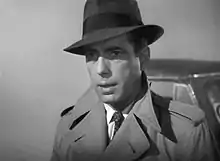
Humphrey Bogart as Rick Blaine in Casablanca (1942)
Humphrey DeForest Bogart (December 25 1899 – January 14 1957), nicknamed Bogie, was an American film and stage actor known for his roles in such films as The Maltese Falcon, Casablanca and The Big Sleep. His performances in Classical Hollywood cinema films made him an American cultural icon. In 1999, the American Film Institute selected Bogart as the greatest male star of classic American cinema.
Quotes
- It was practically a masterpiece. I don't have many things I'm proud of but that's one.
- On The Maltese Falcon, as cited in "The Maltese Falcon", TCM
- I'm about as much in favor of communism as J. Edgar Hoover. I despise communism and I believe in our own American brand of democracy.
- "I'm No Communist", Photoplay (March 1948), p. 53
- All you owe the public is a good performance.
- To Frank Sinatra, as quoted in The New York Times (May 17, 1994)
- You're not a star until they can spell your name in Karachi.
- Attributed without citation in Vivian Cook, ""Can they spell your name in Karachi? British and American style spelling"
Literary references to Bogart
- I've seen Humphrey Bogart with one often enough ...
- A man's reply when asked if he knows how to operate an automatic weapon, in Nevil Shute's What Happened to the Corbetts (1939).
Misattributed
- I should never have switched from Scotch to Martinis.
- Alleged last words, but his wife Lauren Bacall denied this. Lauren Bacall. By Myself and Then Some.
Quotes about
- Losing Bogey was horrible, obviously. Because he was young. And because he gave me my life. I wouldn't have had a — I don't know what would have happened to me if I hadn't met him — I would have had a completely different kind of life. He changed me, he gave me everything. And he was an extraordinary man.
- Lauren Bacall, Interview with Larry King on CNN (May 6, 2005)
- It could be that today's conservative movement remains in thrall to the same narrative that has defined its attitude toward film and the arts for decades. Inspired by feelings of exclusion after Hollywood and the popular culture turned leftward in the '60s and '70s, this narrative has defined the film industry as an irredeemably liberal institution toward which conservatives can only act in opposition—never engagement. Ironically, this narrative ignores the actual history of Hollywood, in which conservatives had a strong presence from the industry's founding in the early 20th century up through the '40s, '50s and into the mid-'60s]. The conservative Hollywood community at that time included such leading directors as Howard Hawks, Frank Capra, and Cecil B. DeMille, and major stars like John Wayne, Clark Gable, and Charlton Heston. These talents often worked side by side with notable Hollywood liberals like directors Billy Wilder, William Wyler, and John Huston, and stars like Humphrey Bogart, Lauren Bacall, and Spencer Tracy. The richness of classic Hollywood cinema is widely regarded as a testament to the ability of these two communities to work together, regardless of political differences.
- Govindini Murty, “Hey, Conservatives: It's Safe to Go to the Movies Again”, The Atlantic, (Oct. 12, 2011).
External links
This article is issued from Wikiquote. The text is licensed under Creative Commons - Attribution - Sharealike. Additional terms may apply for the media files.